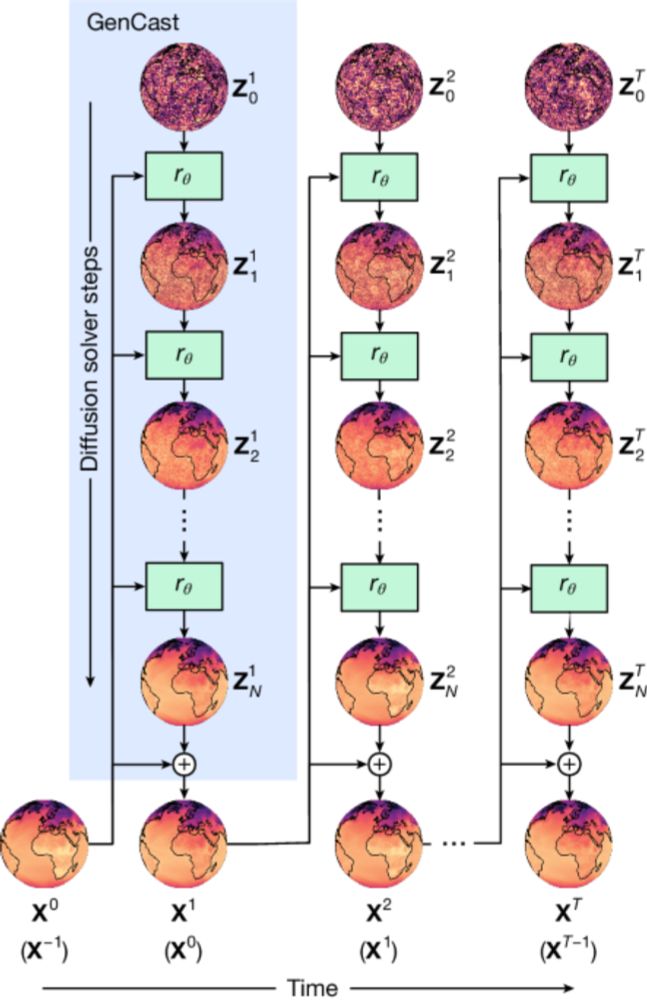Glad you like Weather Lab, Matt!
We also look at all responses we get via the feedback button if you have ideas about how we can make the site more useful.
18.07.2025 17:55 — 👍 2 🔁 0 💬 1 📌 0

Research Engineer, AI for Sustainability
Mountain View, California, US
We're hiring a Research Engineer based in San Fran or MTV, California, to join our sustainability & weather teams at GDM. Seeking strong engineers at the interface of ML, sustainability, weather, dynamical systems, and/or remote sensing: boards.greenhouse.io/deepmind/job...
27.03.2025 13:21 — 👍 12 🔁 2 💬 0 📌 0
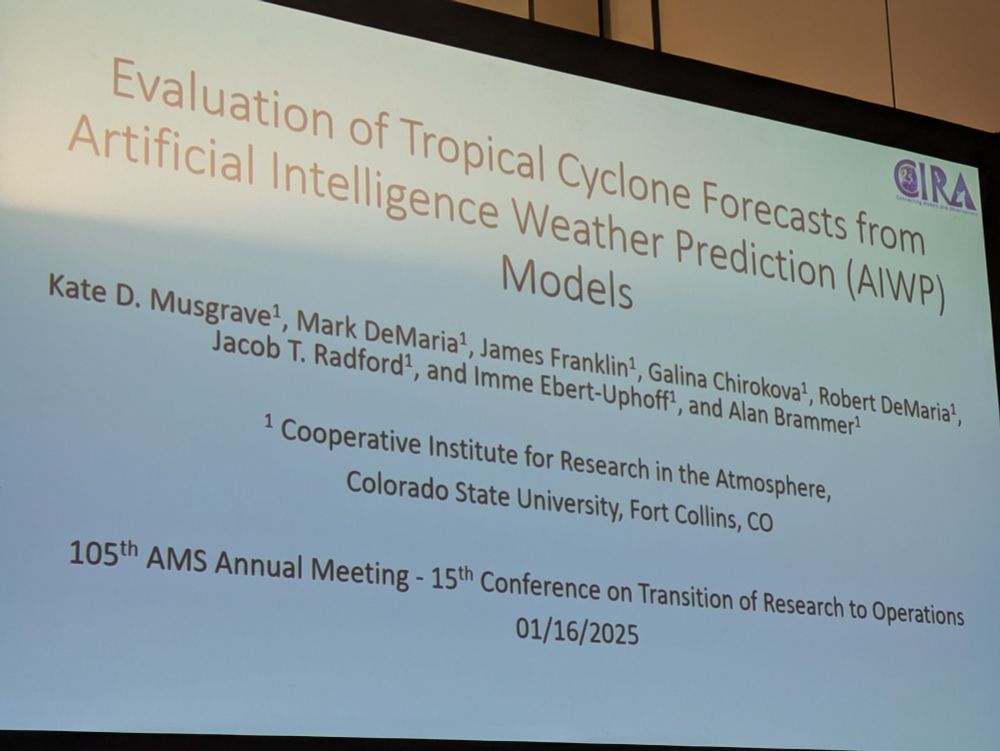
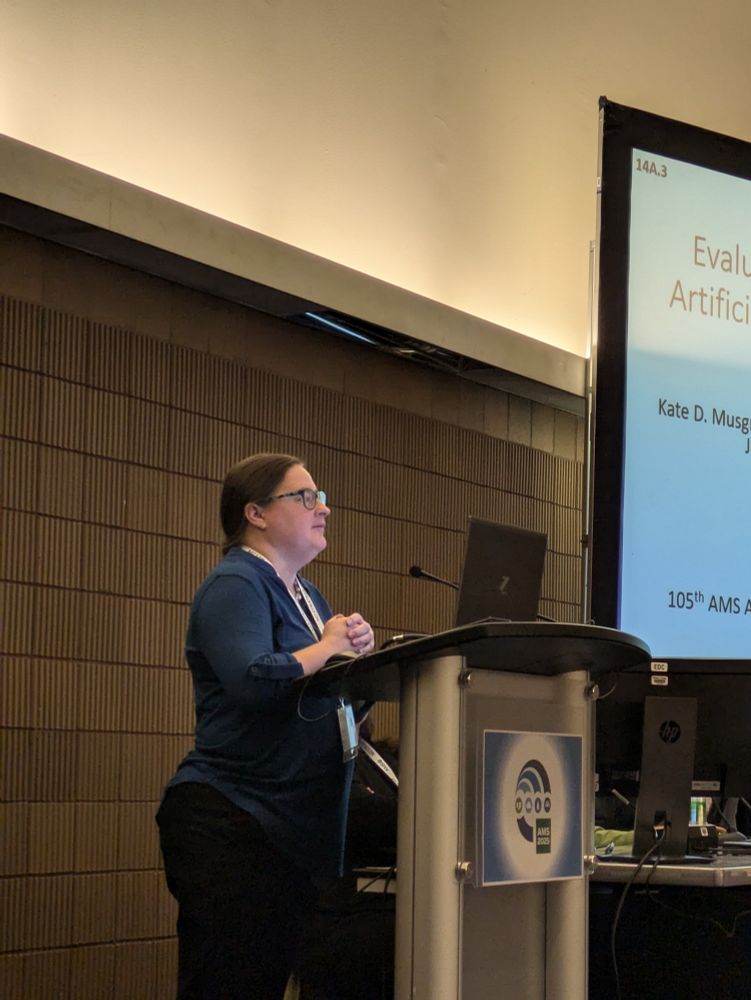
📸: Our researcher Kate Musgrave presenting on AI weather predictions
#AMS2025 | @ametsoc.bsky.social
16.01.2025 17:18 — 👍 13 🔁 1 💬 1 📌 0
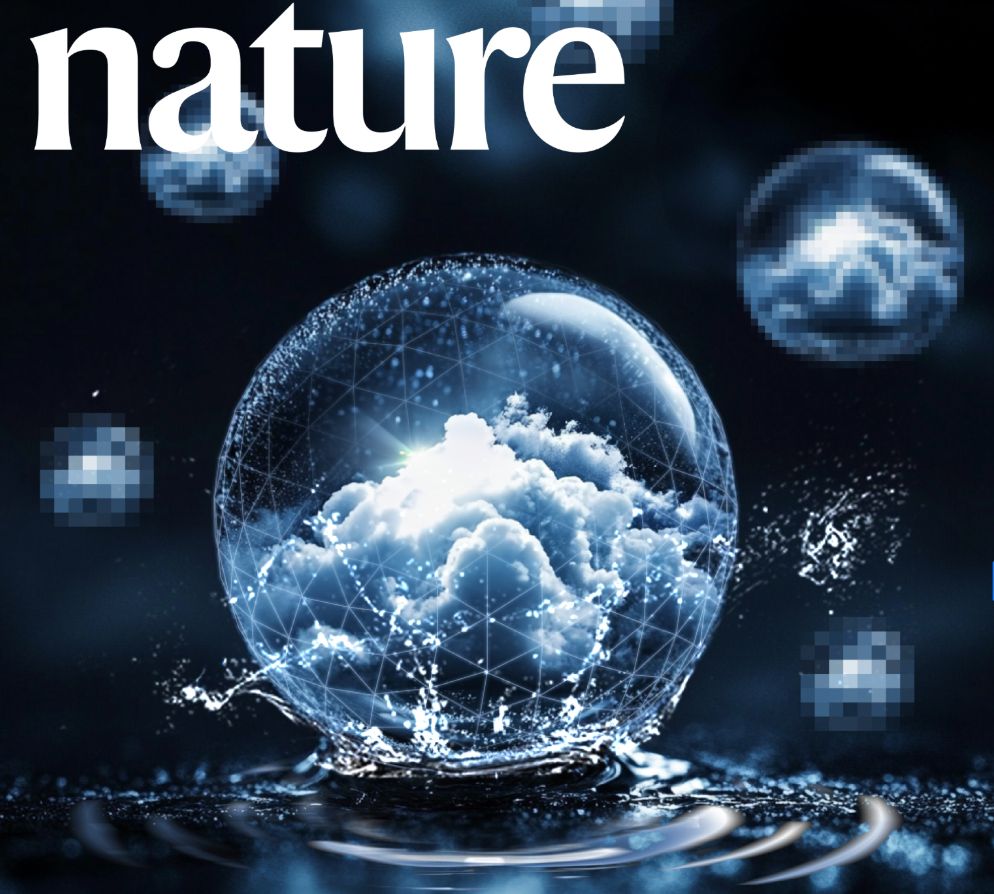
I'll be presenting GenCast, recently published in Nature, tomorrow Tuesday 8h45AM at #AMS2025 in room 339.
GenCast is a diffusion model that outperforms ENS, the top operational ensemble forecast, giving skillful probabilistic forecasts up to 15 days ahead.
ams.confex.com/ams/105ANNUA...
14.01.2025 01:44 — 👍 9 🔁 2 💬 0 📌 0
Ferran's GenCast talk on Tuesday morning at #AMS2025 is not one to miss! ams.confex.com/ams/105ANNUA...
12.01.2025 20:27 — 👍 18 🔁 1 💬 0 📌 0
I'll be at #AMS2025 next week alongside some other Google DeepMind colleagues behind GenCast/GraphCast. Excited to meet people, discuss ML for weather, and learn!
10.01.2025 16:24 — 👍 7 🔁 0 💬 0 📌 0
Welcome, Jeff, and thanks for the links!
06.01.2025 15:09 — 👍 3 🔁 0 💬 0 📌 0
Can everyone come over from LinkedIn now 😅 There’s still more of the ML/Earth sciences community active on there than BlueSky I feel
29.12.2024 11:02 — 👍 7 🔁 0 💬 0 📌 0
dynamical tests would be in my top 3 too :-)
29.12.2024 10:55 — 👍 3 🔁 0 💬 0 📌 0
Yeah ofc there are indirect benefits from crewed space exploration and non-Earth-related spacecraft, even if just for the sake of knowledge
I’m speaking more to a shift in myself while at uni, realising there are too many urgent problems on Earth for some Muskian Mars colonisation project lol
27.12.2024 22:26 — 👍 2 🔁 0 💬 1 📌 0
I love how William Shatner from Star Trek went to space and realised how horrible it is in contrast to our beautiful home planet.
My life goal used to be to help get humans to Mars. I’m so glad I realised how special Earth is and now work on better living here rather than leaving 🌍
27.12.2024 15:08 — 👍 6 🔁 0 💬 1 📌 0
See you at AMS!
24.12.2024 10:04 — 👍 0 🔁 0 💬 1 📌 0
It's @ecmwf.bsky.social keeping the tradition this year 😉
bsky.app/profile/rasp...
23.12.2024 22:40 — 👍 3 🔁 1 💬 1 📌 0
I ran into this as well - there is a separate button for uploading animations (next to the static image one).
Nice work by the way!
23.12.2024 22:36 — 👍 0 🔁 0 💬 0 📌 0
My personal opinion (and I think general consensus) is that while purely data-driven modelling already excels from nowcasting to medium-range timescales, it is not the right paradigm for climate forecasting. Very fast ML/physics hybrid GCMs like NeuralGCM will be the way to go.
cc @stephanhoyer.com
10.12.2024 13:26 — 👍 3 🔁 0 💬 0 📌 0
Actual rollout schematic animation here:
10.12.2024 13:20 — 👍 2 🔁 0 💬 0 📌 0
Looks like Bluesky has a separate button for videos that I missed 🙃 Actual Milton animation here:
10.12.2024 13:20 — 👍 4 🔁 0 💬 1 📌 0
Interested in AI weather/climate modeling at #AGU24?
I'll be giving an overview talk on NeuralGCM at 11:30am Wed at the Google booth, and an talk on modeling precipitation with NeuralGCM at 4:25pm Wed in the session A34A.
09.12.2024 17:42 — 👍 35 🔁 8 💬 1 📌 1
It's been an honour to work on this study led by Ilan Price with such a talented team ✨: Alvaro Sanchez Gonzalez, Ferran Puig, Andrew El-Kadi, Dominic Masters, Timo Ewalds, Jacklynn Stott, @shakirm.bsky.social, Peter Battaglia, Rémi Lam, & Matthew Willson
10.12.2024 11:00 — 👍 2 🔁 0 💬 2 📌 0
GitHub - google-deepmind/graphcast
Contribute to google-deepmind/graphcast development by creating an account on GitHub.
Like its predecessor (GraphCast), the weights & code of GenCast have been made publicly available: github.com/google-deepm...
We’re looking forward to seeing how the community builds on this!
10.12.2024 11:00 — 👍 5 🔁 2 💬 2 📌 0
A GenCast ensemble member takes 8 minutes on a TPU chip, versus hours on a supercomputer for physics-based models. This opens up the possibility of large ensembles (eg 1000s of members), which could better estimate risks of extreme events. We don't yet know how much this will help.
10.12.2024 11:00 — 👍 2 🔁 0 💬 1 📌 0
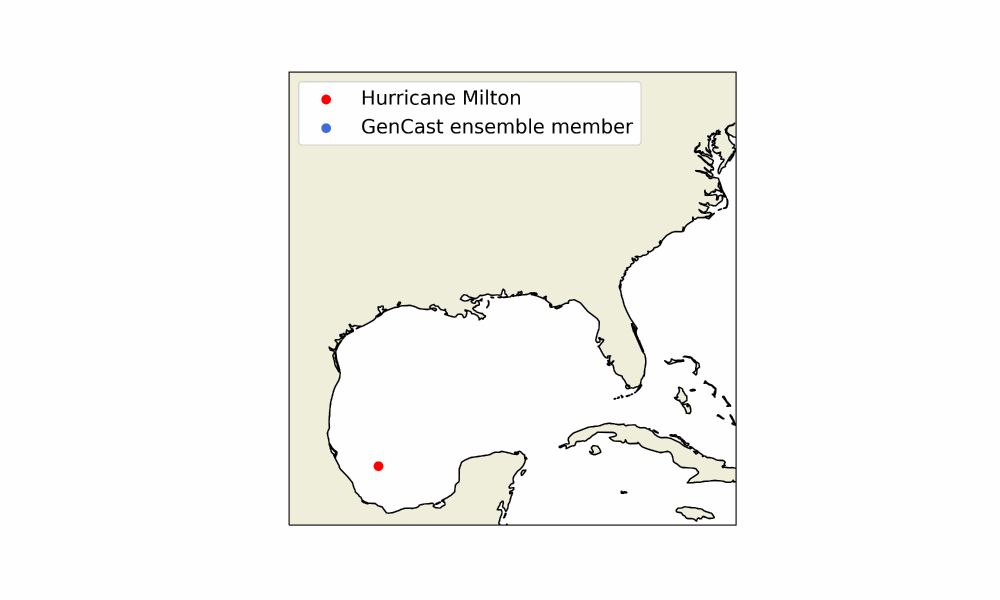
Cyclone max wind speeds are still underestimated, but this performance on tracks is really promising.
One recent devastating cyclone was Hurricane Milton, which caused >$85 billion in damages. GenCast predicted ~70% probability of landfall in Florida 8.5 days before it struck.
10.12.2024 11:00 — 👍 2 🔁 0 💬 1 📌 0
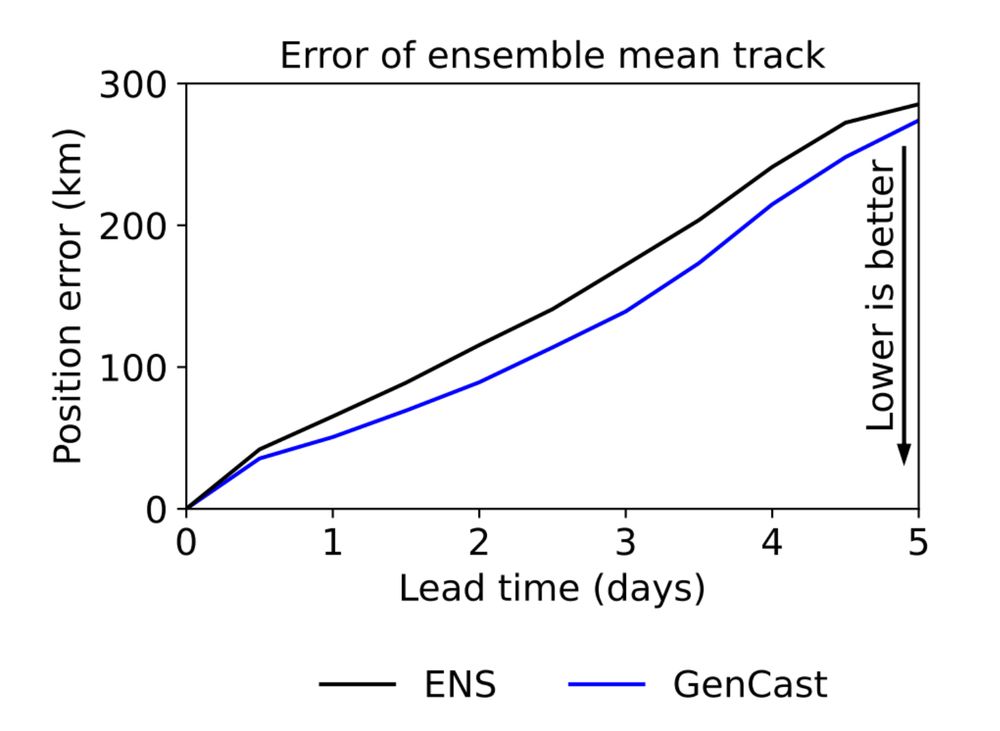
We also extracted cyclone tracks from GenCast and ENS and compared them with ~100 cyclones observed in 2019. GenCast's ensemble mean cyclone track has a 12-hour position error advantage over ENS out to 4 days, and more actionable track probability fields out to 7 days.
10.12.2024 11:00 — 👍 4 🔁 0 💬 1 📌 0
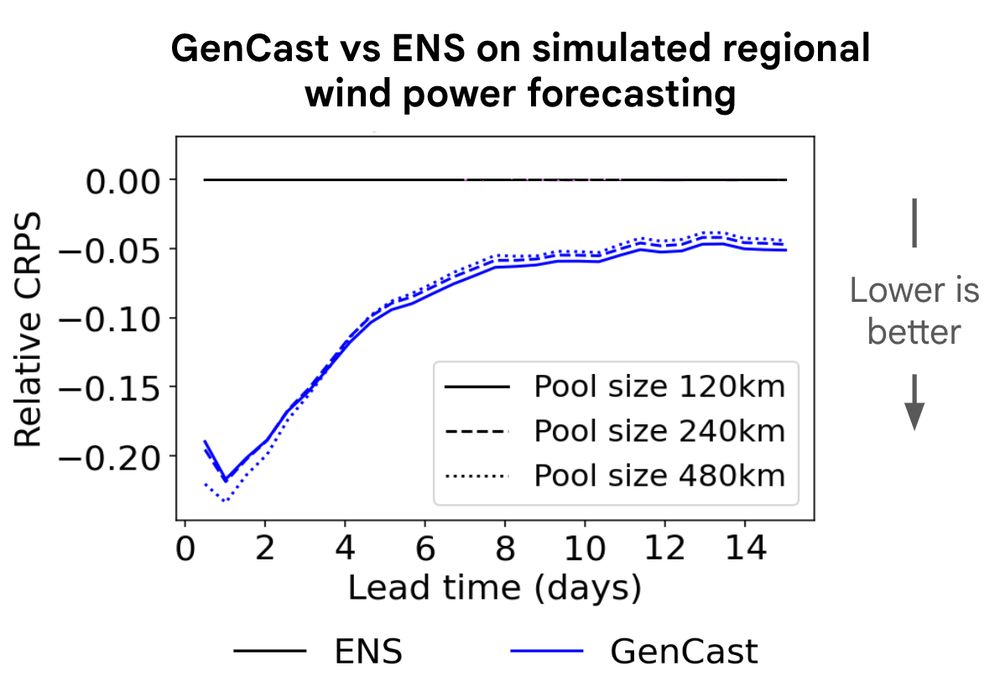
For example, we created a dataset of simulated wind power data at wind farm sites across the globe, and found that GenCast outperforms ENS by 10–20% up to 4 days ahead. This is promising, because better weather forecasts can reduce renewable energy uncertainty and accelerate decarbonisation.
10.12.2024 11:00 — 👍 5 🔁 0 💬 1 📌 0
It’s vital that we ensure these new ML weather systems are safe and reliable. One thing I'm proud of is our range of evaluation experiments: per-grid-cell skill & calibration, spatial structure, renewable energy, extreme cold/heat/wind, and the paths of tropical cyclones (i.e. hurricanes).
10.12.2024 11:00 — 👍 3 🔁 0 💬 1 📌 0
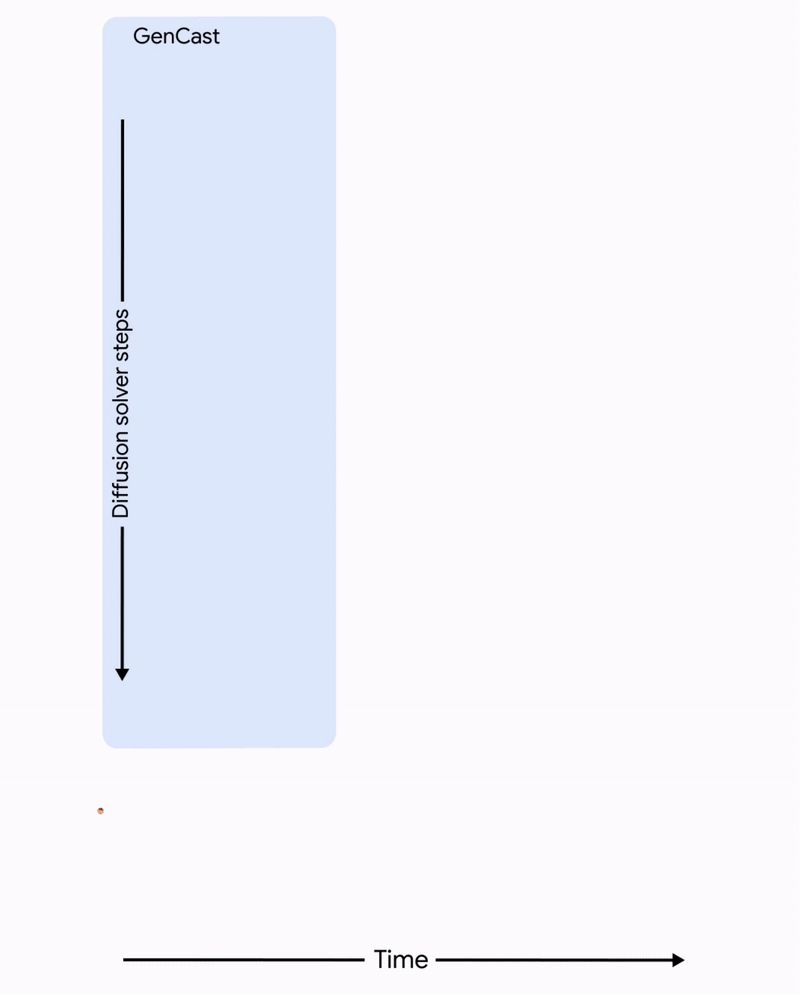
GenCast uses diffusion to generate multiple 15-day forecast trajectories for the atmosphere. It assigns more accurate probabilities to possible weather scenarios than the SoTA physics-based ensemble system from ECMWF, across a 2019 evaluation period.
10.12.2024 11:00 — 👍 3 🔁 0 💬 1 📌 0
Senior meteorological scientist at @windbornewx.bsky.social & web developer
Univ. of Miami hurricane researcher 🌀 living in New Mexico 🏜.
Husband and dog dad. 🏳️🌈
https://bmcnoldy.earth.miami.edu/
Hurricane Specialist and Storm Surge Expert at Miami's WPLG-TV Local 10 News. Posts my own.
http://linktr.ee/michaelrlowry
Advancing transformative climate solutions. Analysis, insights, and research from the Climate, Economics, Finance and Equity team at the World Resources Institute.
Same @WeatherProf as Twitter. Posting about climate and weather. Chief Meteorologist and Climate Specialist WFLA NBC Tampa
I am the trick my mother played on the world.
Xennial Meteorologist in Houston. Forecasts: theeyewall.com & spacecityweather.com. Thoughts: mattlanza.substack.com
I like books, history, sports cards, baseball, Rutgers, #BHAFC.
Opinions my own.
Associate professor at UArizona. Hurricane mortician. Open science + Python + scicomm + 🐈 enthusiast. This is my only bsky account. Opinions mine.
Senior newsroom meteorologist. Lover of snowstorms and hurricanes. And kitties 🐈⬛
Meteorologist, writer, producer at AccuWeather. PA/USA
WeatherMatrix - Since 1996 - "The Weather is Always Interesting."Also @WeatherMatrix on TW/FB/IG/YT/MD
Experimental weather maps at WeatherWatchers.Org
Meteorologist & climate journalist. Dad. Birder. Minneapolitan & 2026 Nobel Peace Prize nominee. Optimistic to a fault.
Science news with attitude for The Guardian. Author of The Future Earth.
DM to contact me securely on Signal
CIRA Deputy Associate Director - Global Systems Laboratory - Boulder, CO
Here for meaningful and intentional conversations about how to move the weather enterprise forward.
Senior Hurricane Specialist, NHC- posts are my own.
Former Chief, Hurricane Specialist Unit, National Hurricane Center, NOAA/NWS (retired). Mostly weather posts, with occasional forays into grammar and usage, word play, and south Florida sports.
I study high-impact weather, help develop high-resolution models to improve weather forecasts, and mentor scientists. Constantly striving to help those around me flourish. My views expressed here are mine alone.
Postdoc at Géoazur, Université Côte d'Azur | seismology, Deep Learning, Distributed Acoustic Sensing, rock mechanics
Robotics Researcher at Google DeepMind
Senior Research Director at Google DeepMind in our San Francisco office. I created Magenta (magenta.withgoogle.com) and sometimes find time to be a musician.
Climate scientist. Building hybrid climate models at Google research.
@NCState | Meteorologist/Stormwater for @RaleighGov and Freelance for @WRAL| Founder of North Carolina’s Weather Authority with over 650k followers on FB|
https://t.co/rmPgbwdgpH












